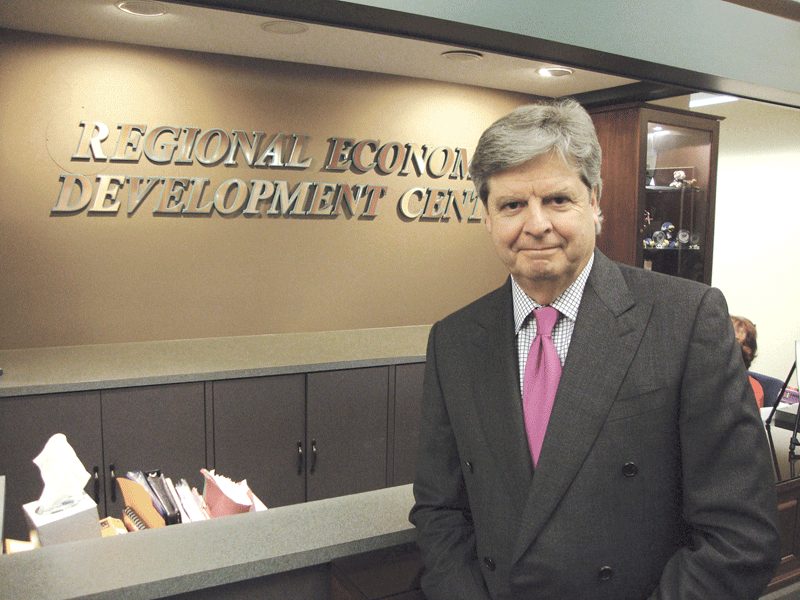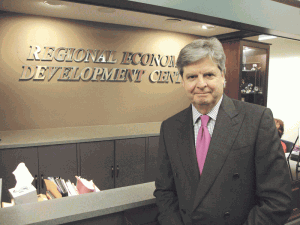
Getting Down to Business: Playing Matchmaker
The EDC Focuses on Promoting the Region and Its Assets

Allan Blair says quality jobs, public and private investment, and an increase in visitors to Western Mass. are keys to stimulating the regional economy.
Editor’s Note: This is the second in a series of stories spotlighting the work being done by area chambers of commerce and other economic-development-related agencies. For this issue, we profile the Economic Development Council of Western Mass.
The full measure of his organization, Allan Blair will tell you, is pretty straightforward. “Three goals,” he began.
Blair is president and CEO of the Economic Development Council (EDC) of Western Mass., and he explained that those goals to stimulate the regional economy are quality jobs, public and private investment, and bringing in additional visitors. “Those three goals,” he continued, “as broad as they are, contribute to increasing economic development, and there are a number of different strategies for how we go about that, a variety of methods to stimulate economic vitality, and a host of affiliated partners to help make that happen.”
The EDC was created in 1996, when a group of business leaders at some of the larger companies in the region came together in support of a unified organization to make Western Mass. more competitive on a variety of fronts.
“We had a lot of well-intentioned organizations doing a lot of hard work,” Blair said, “but there was little coordination or collaboration between the groups. Therefore, the feeling was that the region wasn’t acting efficiently — we weren’t speaking with one voice on the most important issues of the region.”
The business leadership charter group of the EDC created this organization that initially included the mayors of six cities (now nine) and the presidents of the colleges and universities. The idea was to have in one place a public-private partnership with the common goal of economic development. “We hear about the conceptual importance of such entities all the time,” he added. “They made it real.”
In addition to that group of individuals, a host of business-sponsored organizations were included that are now known as affiliated partners. The names may have changed a bit over time, but those partners now are the Affiliated Chambers of Commerce of Greater Springfield, Westmass Area Development Corp., the Greater Springfield Convention and Visitors Bureau, the Westover Metropolitan Development Corp., and the business-improvement districts (BIDs) in Springfield, Westfield, Northampton, and quite possibly soon to be a fourth in Amherst.
There’s also a board of directors, comprised of elected representatives from the EDC’s membership. Peter Straley, president and CEO of Health New England, is the current chairman of the board. In his assessment of the EDC, there’s never been a more important role for such an organization in this region. “At a time when the economy has not been worse in our lifetimes,” he said, “that’s a real challenge — to stimulate job growth, with good jobs, in our local economy.”
And that means it’s time to get down to business, something the EDC has been doing for more than 15 years in Western Mass. Speaking to BusinessWest recently, both Blair and Straley spoke of the importance of their organization and how its goals are accomplished. “It’s important that there’s a regionally focused board looking down over all of this,” said Blair. “The most essential thing is that we’ve got the right people looking at the potential here.”
Center of Attention
Each year, the EDC assesses the different projects it believes will affect economic development in the region in the year or years ahead, Blair noted, “and then we organize our efforts around those targets.”
And, as they say, there’s strength in numbers.
It’s here that the EDC excels in its mission, and both men described the expertise that so many different affiliate partners can bring to the proverbial table. For example, the convention bureau is the primary player in attracting visitors, Blair said, and the Westmass and Westover entities are the ones responsible for maintaining an inventory of industrial- and business-park land to be available and appealing to both outside investors and companies within the region who are expanding. The chambers of commerce are best in the support and promotion of smaller businesses, and the BIDs are essential in making those local businesses aesthetically attractive and well-kept.
Straley said that such a comprehensive look, from the largest issues down to the smallest details of downtowns, is a key aspect to giving the region a competitive advantage in attracting outside investment. The EDC not only strives to make those details manifest, but to showcase them as well.
Site selectors are employed by companies seeking to relocate or branch out into new markets, and the EDC knows how they operate. “When someone from outside the area is looking to relocate a business, they’ll typically use consultants that will do the legwork for them,” he explained. “Those consultants will start by gathering information about a region, starting with the broadest end of a funnel, and narrowing it down, based on their clients’ requirements.”
The EDC’s Web site is the only dedicated source of information in the region specifically targeting those consultants. “It turns out that it is the primary point of contact for site selectors,” Straley continued. “If a manufacturing or distribution company says it needs a Northeast location, let’s say, obviously they’ve got a lot of places to choose from. What we’re doing is presenting a good face to the outside world for those consultants. They’ll be looking at the demographics of the area, what kind of businesses are in the area, is there a trained workforce in the area that we can tap into, what are the education levels of people in the region … all before they are even going to consider coming to look.
“In a sense, we’re acting as the matchmaker,” he went on. “Quite frankly, in this business, it’s difficult to land a final account. It’s like any sales business; with the economy the way it is, the length of time companies are taking to make final decisions about relocating and expanding is lengthening. More than ever, you need to be on top of that follow-through.”
Focal Point
While each city has its own economic-development team, the EDC works with all of them to get those businesses into “the funnel,” as Straley called it. “They’re all going to be competitive with one another to secure those companies, but it’s our job to get them into this region.”
Civic leaders, college presidents, and CEOs move in and out of the EDC’s purview owing to their own professional trajectories, but Blair said that, almost without exception, each new, incoming leader realizes the organization’s importance. Meeting quarterly with mayors is typically one of the few times they all convene, and it allows them the chance to think about their cities from a macroeconomic perspective.
“The region is entirely interdependent,” Blair explained. “The reality is that every community is dependent on a business’s employees and how they spend money. Yes, the notion of municipal growth is hugely important to every mayor, and how they can make some tactical moves to attract that investment. But it’s just as important for a company to know that they are locating in a region with good regional school systems that are supporting a strong workforce pipeline as it is for the company to know about the taxes and the regulatory environment in its own community.”
There are a few initiatives on the EDC’s radar for the year ahead. The Holyoke Green High Performance Computing Center is an important initiative for not only the Paper City, but the region as a whole. The Ludlow Mills initiative and the Three County Fairgrounds in Northampton are both targeted areas of interest, and Blair said the term ‘Knowledge Corridor,’ now nearly a dozen years old, will be further developed as a brand.
“We need to turn that term into more of a positive action,” he said, “by providing a single point of contact where an outside interest can access everything within those 14 institutions that they would need to know, and to help them focus their attention on bigger issues within the region so that they could collectively make a contribution.”
While the EDC’s agenda has no small number of directives, stimulating the regional economy clearly has some specific targets, including the promotion of entrepreneurship.
“One of the things we all need to be reminded of is that most of the growth the region has had is by companies that were started here,” Blair said. “We’re not a region that has a lot of big companies move here. When you look at our biggest corporate presences — Peter Pan, MassMutual, Smith & Wesson, Milton Bradley — they all started here, and they grew into something important.
“At some point in their history it started as an entrepreneur who took a risk, and who built a culture,” he continued. “Have we lost that? Do we still have it? And if we still have it, is there something we can do to stimulate it so that we have more innovators, so that there are more people willing to take these risks for the rewards that will come?”
If there’s anything that his organization has managed to do, he went on, it has been the ability to open everybody’s horizons to all the issues that are affecting economic development.
“Before, we could be in our little silos and could miss an awful lot of opportunities coming our way,” Blair said. “Now, everybody’s aware of the landscape and understands their place within it. They have a more wide-angle view, and that’s really an important thing for us to have, for the business leadership to have, to have a wide-angle view of what’s going on and then to focus on the things that need to be done.”





